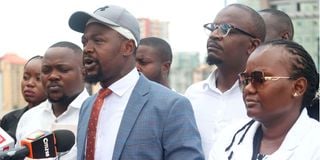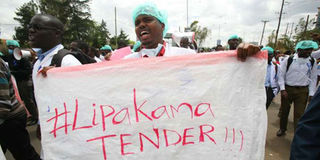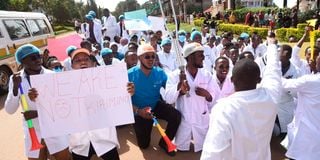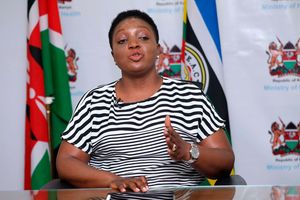Inside eight-hours tense closed-door talks that failed to end doctors’ strike

Kenya Medical Practitioners, Pharmacists and Dentists Union Secretary General Davji Atellah addresses journalists at the union's headquarters along Kindaruma Lane in Nairobi on March 18, 2024.
What you need to know:
- Uncertainty looms over the future of the health service after talks broke down.
- Doctors have vowed to continue the strike until their demands are met.
- The government accuses the doctors of refusing to compromise.
As senior government officers and the Kenya Medical Practitioners and Dentists Union (KMPDU) officials entered the negotiations room at Kenyatta International Convention Centre (KICC) on Thursday afternoon, there was unspoken tension in the air.
The representatives of both parties settled into their seats, facing each other with expressions that betrayed their inner turmoil.
It was clear: these two sides, brought together by duty yet divided by a chasm of diverging interests, inhabited worlds apart.
As the clock ticked towards 5:30 pm on Thursday, Chief of Staff Felix Koskei entered the room. All eyes turned towards him, hoping that he could end the eight-day strike that had left many patients without care.
Other parties attending the talks as ordered by the court were Cabinet Secretaries Njuguna Ndung’u (Treasury), Moses Kuria (Public Service), Florence Bore (Labour and Social Protection) and representatives of the Public Service Commission (PSC), Salaries and Remuneration Commission (SRC) and the Council of Governors.
The representatives of KMPDU sat with determined expressions, ready to fight for their demands. On the other side of the table, government officials adopted stoic expressions, bracing themselves for a battle of wills.
From the get-go, Mr Koskei expressed a firm desire to see an end to the ongoing strike lamenting that it was costing the most vulnerable in the society. He hoped that the doctor’s strike now dragging into its 10th day, would be the nation’s last.
“Each ministry must step up and play its role in getting solutions to the disputes at hand. We all have the responsibility to climb down for the benefit of Kenyans,” he urged the them.
The spectre of strikes has plagued Kenya’s medical field for years, with a major strike in 2017 that left a devastating mark. Thousands of Kenyans were denied critical medical attention during the 100-day crisis.

Striking doctors protest outside Afya House in Nairobi during a past job boycott.
Yet, lightning has struck the same place twice. This time, with Susan Nakhumicha at the helm of the Ministry of Health and Dr Davji Atellah as the secretary general, KMPDU.
Just before journalists were escorted out of the negotiating room, Linus Kariuki, the chairman of the mediation committee, then outlined the 19 key grievances that had fueled the union’s strike.
Setting the stage in a tense atmosphere of deliberation, the meeting started with an opening prayer from Dr Dennis Miskellah - KMPDU, deputy secretary general, who asked God to have mercy on everyone in the room since they had let down Kenyans.
Health, Labour, Treasury ministries made their remarks. PSC and SRC made their remarks too.
CS Labour was the first to make her remarks asking for more time for talks, adding that she has put together a mediation team.
Ms Bore was followed by Prof Ndung’u, who said that there was no money, the country was struggling and resources were limited.
Nandi County Governor Stephen Sang then interjected indicating that the county bosses were forced by the previous administration to sign the Collective Bargaining Agreement (CBA) and that they did not indicate that they would implement the agreement.
“We were not part of the meetings that cleared the CBA for implementation,”
The Chief of Staff then turned to the union officials asking them to call off the strike based on the court order. KMPDU then demanded that the government implements the CBA which was a court order before it calls off the strike.
Hours bled into one another outside the closed doors. The journalists, forced into a tense waiting game, became adept at deciphering the mood from the room. Every creak of the heavy door sent a jolt through the lobby.

Doctors demonstrate in Eldoret town, Uasin Gishu County on March 01, 2024, over the attack of medics' union Secretary General Dr Devji Atellah.
After three hours into the talks, KMPDU members walked out to deliberate on the bare minimum. What they could get from the negotiation table from the 19 issues that they had raised.
After 20 minutes, they went back to the negotiation room and the government side was not ready to listen to the bare minimum proposal. However, they demanded that the Union nominates people to the multiagency team, which would isolate the issues into immediate, mid, short and long-term priorities.
The union then gave four names. The government then demanded that before the restructuring of the issues, the Union officials accompanied by the government officials had to call off the strike. But the union officials refused to call off the strike demanding that the issues they raised be addressed first.
It is reported that there were threats and intimidation in the room with the government saying that medical interns were not special in any way as compared to other interns in other professions.
At about 11: 30pm, the union asked for time off from the closed-door meeting. They met their members and came back after 10 minutes.
The two officials, Dr Davji Atellah-secretary general, KMPDU and Dr Miskellah then went to a private room together with all the ministers representatives and Mr Koskei.
The same conversation of the bare minimum and calling off the strike took centre stage with promises from the government side under the condition that the union calls off the strike. The officials indicated that they could not call off the strike at night and also that there was nothing tangible that the government was offering.
“They spoke nicely, telling us how they would not lie to us and that they were ready to implement the CBA, we gave the committee time to deliberate on the issues then we could see which ones could be tackled immediately but only after we call off the strike. How could we do that? Our members have suffered,” a union official told the Nation.
One point of contention emerged: the title ‘intern’.
The government argued that pay for interns should be harmonised across all professions and questioned why medical interns were paid more than their contemporaries.
“On the issue of internship, we have agreed that the term ‘intern’ is a bit confusing and we have that in all professions. Our friends want them to be called interns and they are paid Sh206,000 as opposed to other interns who are paid between Sh25,000 and Sh35,000 and at the same time (we) absorb all of them,” said Mr Koskei.
He added: “We are saying we want to harmonise payments across the board and because they passionately explained the role of an intern doctor and having realised that an intern doctor is a qualified doctor who has graduated and a doctor who does everything that is required of a doctor when he is posted, only that he is under supervision for a year. We agreed that the term intern may not be appropriate for a doctor because they are qualified and working.”
Dr Atellah strongly disagreed with the recommendation, he insisted that the existing Medical Practitioners and Dentists Act already provides a clear definition of the term “intern”.
“CAP253 of the Act of Parliament states that an intern is a doctor who has graduated, taken an oath, and is working under supervision. In our CBA, it is well defined in job group L. Changing the title does not change the work that they do at the hospitals,” he said.
The union officials then excused themselves and joined the other members in a closed-door meeting in a separate room not to return to the negotiation room.
The walkout served as a stark symbol of the breakdown in communication and trust between doctors and the government. It underscores the deep-seated divisions and the growing sense of urgency to address the issues at hand.
Mr Koskei and the CSs walked out of the private room and went to the negotiation, hoping that the doctors would join them. Only for the doctors not to show up. Both sides addressed the media separately reading from different scripts.
The government side addressed the media on Friday at exactly 1:45 am officially indicating that there was no strike; the union addressed a parallel presser at about 2:02 am insisting that the strike was still on.
Despite efforts to find common ground, the meeting ended in an impasse. Doctors vowed to continue their strike until their demands were met, while government officials expressed frustration at what they see as an obstinate refusal to compromise.
In the aftermath of the failed meeting, uncertainty looms, casting a shadow over the future of healthcare in the country.
The one thing that seemed to have been agreed upon by both parties during the Thursday meeting, was the formation of a 13-member committee, with four representatives from the union, three from the Ministry of Health and the rest from key stakeholders such as the Council of Governors.





